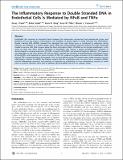The Inflammatory Response to Double Stranded DNA in Endothelial Cells Is Mediated by NFκB and TNFα
Author(s)
Patel, Suraj J.; Jindal, Rohit; King, Kevin R.; Tilles, Arno W.; Yarmush, Martin L.
DownloadPatel-2011-The Inflammatory Res.pdf (431.5Kb)
PUBLISHER_CC
Publisher with Creative Commons License
Creative Commons Attribution
Terms of use
Metadata
Show full item recordAbstract
Endothelial cells represent an important barrier between the intravascular compartment and extravascular tissues, and therefore serve as key sensors, communicators, and amplifiers of danger signals in innate immunity and inflammation. Double stranded DNA (dsDNA) released from damaged host cells during injury or introduced by pathogens during infection, has emerged as a potent danger signal. While the dsDNA-mediated immune response has been extensively studied in immune cells, little is known about the direct and indirect effects of dsDNA on the vascular endothelium. In this study we show that direct dsDNA stimulation of endothelial cells induces a potent proinflammatory response as demonstrated by increased expression of ICAM1, E-selectin and VCAM1, and enhanced leukocyte adhesion. This response was dependent on the stress kinases JNK and p38 MAPK, required the activation of proinflammatory transcription factors NFκB and IRF3, and triggered the robust secretion of TNFα for sustained secondary activation of the endothelium. DNA-induced TNFα secretion proved to be essential in vivo, as mice deficient in the TNF receptor were unable to mount an acute inflammatory response to dsDNA. Our findings suggest that the endothelium plays an active role in mediating dsDNA-induced inflammatory responses, and implicate its importance in establishing an acute inflammatory response to sterile injury or systemic infection, where host or pathogen derived dsDNA may serve as a danger signal.
Date issued
2011-05Department
Harvard University--MIT Division of Health Sciences and Technology; Massachusetts Institute of Technology. Department of Biological EngineeringJournal
PLoS ONE
Publisher
Public Library of Science
Citation
Patel, Suraj J. et al. “The Inflammatory Response to Double Stranded DNA in Endothelial Cells Is Mediated by NFκB and TNFα.” Ed. Holger K. Eltzschig. PLoS ONE 6.5 (2011) : e19910.
Version: Final published version
ISSN
1932-6203